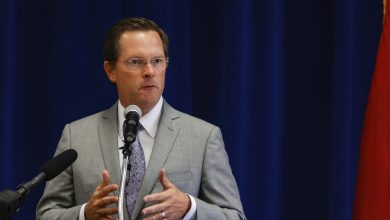Florida’s President Resisted Conflict. And Became an Emblem of College Leadership in Polarized Times.

[ad_1]
Announcing his plans on Wednesday to step down as president of the University of Florida, W. Kent Fuchs invited an examination of a leadership legacy that has become emblematic of the college presidency in a polarized age.
Fuchs, who is beginning his eighth year as president, said in a videotaped statement that he planned to resign from the post in about a year, when a successor is named. His tenure will no doubt be remembered as one that coincided with the university’s rising national prestige, but also for a series of cascading political controversies tied to the pandemic and academic freedom.
Covid-19 has challenged college presidents nationwide, but its politics have been particularly acute in Florida, where conservative lawmakers and Gov. Ron DeSantis, a Republican, have opposed vaccination and mask mandates. In August, during the Delta-variant surge, Fuchs told faculty members that he was powerless to mandate masks in campus buildings, a policy that he said would run afoul of state rules.
Forced to ignore the university’s own medical experts on a matter of public safety, Fuchs appeared in his remarks both to accept and to starkly define the limits of his presidency — one in which he, as a state actor, is increasingly hemmed in by assertive politicians and their appointees to the university’s and state system’s governing boards.
It was against this backdrop that, in late October, another politically charged controversy spilled into public view. The New York Times broke the news that the university had barred three political-science professors from testifying as experts in a voting-rights case, saying it was against the university’s interests to oppose the state in court. (Under fire, the university reversed its position, and Fuchs accepted a task force’s recommendations to change its conflict-of-interest policy.)
Taken together, the controversies of recent months have complicated perceptions of Fuchs, a soft-spoken, 67-year-old engineer whose bold ambitions for the university are coupled with a style of political pragmatism that — at least in public — does little to challenge the state’s conservative majority. In many ways, the university has gotten during Fuchs’s tenure what it has long said it wanted: increased financial support from the state, and a rise in the U.S. News & World Report rankings, where UF now holds the No. 5 spot among public universities.
But Fuchs’s presidency has raised a deeper question about whether, in all of that striving, the university lost a sense of autonomy, and caved too readily when major principles were at stake.
What Is Politically Possible
In the fall of 2014, UF’s board named Fuchs, then provost of Cornell University, as its next president. His appeal to the university, which already had its eyes set on a big rankings climb, was obvious on paper: a seasoned administrator with the patina of the Ivy League and a background in engineering, one of UF’s top programs. Fuchs brought, too, a master’s degree in divinity, and he seemed to embrace an almost nostalgic role as an avuncular university president glad-handing with students on the quad.
But the politics that have come to eclipse Fuchs’s tenure of late were baked into the job from the start. His predecessor, J. Bernard Machen, had actually delayed a planned retirement after striking a deal with Rick Scott, the governor at the time, who promised to steer more cash toward UF if Machen would stay on board.
That deal, which prompted UF to spike a national presidential search at the final hour, opened the door to the university’s rapid ascent in the rankings. Florida’s faculty seemed fine with that kind of political intervention. What’s happened in recent months, however, suggests the more unwelcome consequences of political coziness.
In December, an ad hoc committee of the Faculty Senate released a report on academic freedom, detailing concerns from professors who said they worried their research could “put them at odds with political actors.”
“Such a climate of self-censorship is chilling at an institution that strives to be considered among the nation’s most elite,” the report stated.
There is evidence that professors have been told to avoid attracting negative political attention. In one instance, a professor says, an administrator advised him to not use the words “critical” and “race” in naming a curricular concentration, because they could draw the ire of conservatives who oppose “critical race theory.” In notes of the meeting, Christopher Busey, the professor, says he was told that Fuchs was “not in a position to protect the college,” in part because there had been “discussions” about replacing him with Richard Corcoran, a former speaker of the Florida House of Representatives and the state’s current education commissioner.
Underpinning such faculty anecdotes is a sense that the university has struck a bargain: Don’t draw unnecessary attention, and the money will keep coming from the state. Danaya C. Wright, a co-author of the ad hoc committee’s report on academic freedom, says that’s not an acceptable deal.
“You have to stop and ask yourself, Is the damage and the political pressure that’s happening, is that a cost we’re willing to pay for this benefit of being ‘Top Five,’” said Wright, a law professor and former chairwoman of the Faculty Senate.
But what is the alternative? In a hyperpartisan environment, many professors argue that Fuchs has done about as well as one could expect. He may not light himself on fire at the specter of political interference, but he may also have a realistic view of what is politically possible in the state.
Any state university in a Red State right now, you’re navigating these lines.
Notably, when the Faculty Senate, in November, voted “no confidence” in the university’s lack of a mask or vaccination mandate, it did not mention Fuchs by name. Instead, the Senate expressed its lack of confidence in the strategies themselves and in the system-level board that had shaped the Covid policies.
David C. Bloom, current chairman of the Faculty Senate, said the absence of Fuchs’s name in the no-confidence resolution reflected a deeper faculty view: “It is my strong sense that the faculty did not hold him responsible for the restrictions,” Bloom, who is a virologist, said in an email to The Chronicle. “In fact that was brought up at one point during the discussions.”
It is clear, though, that Fuchs’s acceptance of the limits of his power — or his perception of those limits — has not gone over well with all of the faculty. Any president, but particularly one who is running a university with a major academic health center and a public-health program, is sure to be asked: If you can’t stand up in a global pandemic, when will you?
“A lot of people have said, ‘You don’t have the backbone to take on that challenge,’ and I’m sure he was frustrated by that,” Bloom said.
“Any state university in a Red State right now,” Bloom added, “you’re navigating these lines, and I don’t know what the right answer is.”
Fuchs declined an interview request.
‘The Limits of His Tolerance’
Through all of the controversies, Fuchs has had two key assets: He is generally well liked, and he is perceived to be worlds better than the possible alternatives.
If Fuchs had played his presidency differently — if he’d poked his finger in the governor’s eye, for example — he wouldn’t have lasted long, and there is a good chance he would already have been replaced by a politician, said Pradeep Kumar, a former Senate chairman and professor emeritus of physics.
“Had he spoken earlier, had he questioned, he would have been fired and immediately replaced by somebody of a very mediocre reputation,” Kumar said. “In some sense, by keeping things quiet, he kept things under control. Of course, one reaches the limits of one’s tolerance, and Kent Fuchs has reached the limits of his tolerance. The only reason I can think of why he’s doing what he’s doing right now is that he has reached the limit of his tolerance.”
Fuchs first discussed his intention to return to the faculty in a meeting with Morteza (Mori) Hosseini, chairman of the university’s campus-level Board of Trustees, at Hosseini’s office on the afternoon of August 2, Steve Orlando, a university spokesman, told The Chronicle. That timeline suggests Fuchs’s discussions about stepping down predated the national controversy over professors testifying in the voting-rights case. (In his video statement, Fuchs said that he and Hosseini had agreed to make his decision public this month.)
Fuchs’s departure sets the stage for a presidential search at a time when the university is under scrutiny on multiple fronts. Allegations of political interference at the university have prompted investigations by both a congressional subcommittee and the university’s regional accrediting agency, the Southern Association of Colleges and Schools Commission on Colleges.
Jan Greenwood, an executive-search consultant whose firm has assisted in the university’s past three presidential searches, said she expects substantial presidential turnover across the country in the coming years. Would-be presidents, she said, will enter the job market with a lot of options.

Kim Klement, USA TODAY Sports
“There is going to be a lot of competition, and candidates are going to have their choice,” said Greenwood, a co-founder of Greenwood Asher & Associates.
If Fuchs ends up serving for eight years, as he says he expects to do, that’s a pretty good run for a public research university’s president these days. It can be attributed, in part, to what most people say first about Fuchs when asked about him: He’s not a jerk.
Publicly, the only time Fuchs seems to have embraced a dark side is when he dressed up as Darth Vader at a basketball game. That sort of thing — the sense of “play” within the presidency — has been welcome on campus. But these jobs tend to wear people down, and there’s a sense that has happened to Fuchs.
“He had hoped to be here 10 years when he started,” said Lucinda Lavelli, dean emerita of the university’s College of Arts. “But what does that mean? He might feel he’s lived 100 years. This strain is ceaseless.”
Ironically, the question looming over Fuchs’s presidency isn’t whether he is nice. It’s whether he has been too nice.
[ad_2]
Source link






